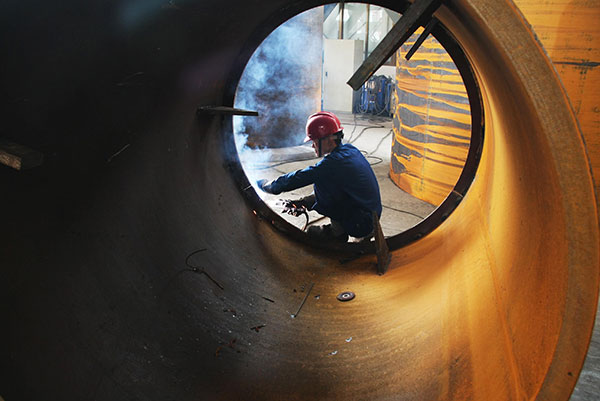


A worker doing soldering at a factory in Nantong, Jiangsu province. Known as the world's factory, China is embarking on a round of industrial consolidation as part of the 'Made in China 2025' national plan to reinvigorate the manufacturing sector.[Xu Ruiping / For China Daily]
Manufacturers that pursue a high-tech approach will thrive in China, despite the economic slowdown. The sector still has a great deal going for it and will remain the backbone of the country's economy, according to Jim Davis, executive vice-president and chief marketing officer of SAS Institute Inc, a leading business analytic software and services company in the United States.
"For sure, some labor-intensive and traditional industries are moving to other countries such as India, Indonesia and Southeast Asia," he said. "But the core production base with research and development centers will remain. And they will reinforce China as a center of regional supply."
Known as the world's factory, China is embarking on a round of industrial consolidation as part of the "Made in China 2025" national plan to reinvigorate the manufacturing sector.
The initiative was proposed by Premier Li Keqiang in March.
Coupled with that, the global technology revolution that is already under way will reshape the world's economic structure and transform China from a manufacturing giant into a manufacturing superpower, Davis said.
"That's why many major countries in the world are looking for a technological and innovation breakthrough."
In 2013, Germany released its "Industry 4.0 Strategy" - a blueprint which combines information and communications technology to boost manufacturing. To some extent, "Made in China 2025" has something in common with Germany's model, as both countries are pushing digitalization and modernization of the manufacturing industry.
But Davis said he does not believe that China should follow the same route.
"I think that China's strategy is a very smart move, but it should not be a replica," he said.
"It should be a customized and innovation-fueled transformation with its own characteristics.
"China used to be a major original equipment manufacturer - a term used when one company makes a part, or subsystem, that is used in another firm's finished product.
"But the country now needs to reduce its OEM dependency and become self-sustaining," he said.
Another key area will be to cut down on waste and increase efficiency when it comes to the manufacturing sector.
"China's focus should probably be on how to make its factories more efficient as well as producing durable and high-quality products," Davis said.
To achieve this, the manufacturing industry should embrace big data. This is a broad term for processing large amounts of complex statistics, which can be boiled down into market and consumer trends, as well as mapping out efficient production techniques.
"By analyzing data, building analytic platforms within the manufacturing environment, they will be able to understand what's actually happening in that process," Davis said.
"By understanding the relevance of data, Chinese manufacturing companies could become sustainable enterprises."
Cliff Wu, president of SAS China, said it was also important to look at the whole supply chain - from the factory to the consumer.
"We know that innovation is fundamental in upgrading manufacturing," he said. "But when you talk about innovation, you need to find new insight, which is based on actual data. This will help improve the supply chain, product quality and inventory."
 Mums stage breastfeeding flash mob
Mums stage breastfeeding flash mob Moscow “spider-man” climbs Chinese skyscraper
Moscow “spider-man” climbs Chinese skyscraper No cleavage allowed at China’s largest gaming expo this year
No cleavage allowed at China’s largest gaming expo this year Photo story: A model’s breast implant surgery
Photo story: A model’s breast implant surgery Student proposes during graduation ceremony
Student proposes during graduation ceremony Kiss contest held in Nanning, SW China
Kiss contest held in Nanning, SW China Bikini beauties lifeguards in river rafting place
Bikini beauties lifeguards in river rafting place Yunnan-Myanmar Road: The past and present
Yunnan-Myanmar Road: The past and present An unbreakable army
An unbreakable army Sharing with strangers
Sharing with strangers US cyber ‘retaliation’ shows hypocrisy
US cyber ‘retaliation’ shows hypocrisy Markets fall again despite govt support
Markets fall again despite govt support China’s police dogs train to sniff out crime
China’s police dogs train to sniff out crimeDay|Week